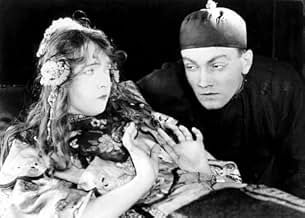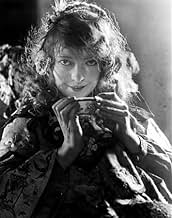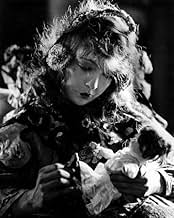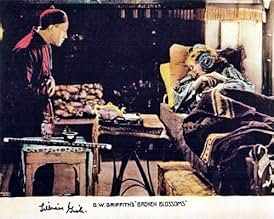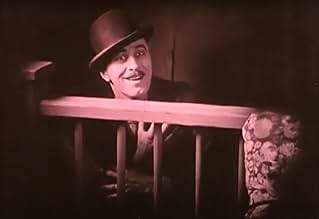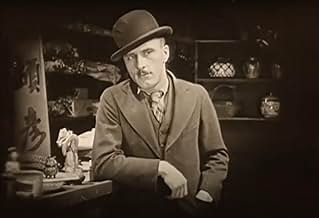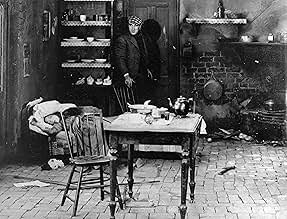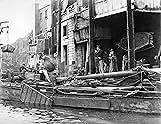Eine Blüte gebrochen
Originaltitel: Broken Blossoms or The Yellow Man and the Girl
IMDb-BEWERTUNG
7,2/10
11.312
IHRE BEWERTUNG
Der Chinese Cheng Huan verlässt seine Heimat, um die Lehren Buddhas in der Welt zu verbreiten. Sein Optimismus verschwindet, nachdem er in London die brutale Realität kennerlernt.Der Chinese Cheng Huan verlässt seine Heimat, um die Lehren Buddhas in der Welt zu verbreiten. Sein Optimismus verschwindet, nachdem er in London die brutale Realität kennerlernt.Der Chinese Cheng Huan verlässt seine Heimat, um die Lehren Buddhas in der Welt zu verbreiten. Sein Optimismus verschwindet, nachdem er in London die brutale Realität kennerlernt.
- Auszeichnungen
- 1 wins total
Lillian Gish
- Lucy - The Girl
- (as Miss Lillian Gish)
Richard Barthelmess
- Cheng Huan - The Yellow Man
- (as Mr. Richard Barthelmess)
Edward Peil Sr.
- Evil Eye
- (as Edward Peil)
Ernest Butterworth
- Secondary Role
- (Nicht genannt)
Frederic Hamen
- Secondary Role
- (Nicht genannt)
Wilbur Higby
- London Policeman
- (Nicht genannt)
Man-Ching Kwan
- Buddhist Monk
- (Nicht genannt)
Bobbie Mack
- Ringside Employee
- (Nicht genannt)
Moy Ming
- Minor Role
- (Nicht genannt)
Steve Murphy
- Fight Spectator
- (Nicht genannt)
George Nichols
- Police Constable
- (Nicht genannt)
Karla Schramm
- Burrows' Girlfriend
- (Nicht genannt)
Bessie Wong
- Girl in China
- (Nicht genannt)
Handlung
WUSSTEST DU SCHON:
- WissenswertesThe film was produced by D.W. Griffith for Adolph Zukor's Artcraft company, a subsidiary of Paramount Pictures. However, when Griffith delivered the final print of the film to Zukor, the producer was outraged. "How dare you deliver such a terrible film to me!" Zukor raged. "Everybody in the picture dies!" Infuriated, Griffith left Zukor's office and returned the next day with $250,000 in cash, which he threw on Zukor's desk. "Here," Griffith shouted, "If you don't want the picture, I'll buy it back from you." Zukor accepted the offer, thus making this the first film released by United Artists, the production company formed in 1919 by Mary Pickford, Charles Chaplin, Douglas Fairbanks, and Griffith. It was a remarkably successful film, both critically and at the box office.
- PatzerThe intertitles state, "The Buddha says, 'What thou dost not want others to do thee, do thou not to others.'" It was actually not the Buddha but Confucius' teaching.
- Zitate
Lucy Burrows: Don't do it, Daddy! You'll hit me once too often - and then they'll - they'll hang yer!
- VerbindungenFeatured in The Philco Television Playhouse: The Birth of the Movies (1951)
Ausgewählte Rezension
"In this scarlet house of sin, does he ever hear the temple bells?" Broken Blossoms is the movie I use to introduce people to silent film who only know it from Chaplin shorts or Birth of a Nation. It is one of the most sensitive movies ever made, in my opinion, and is usually overlooked in any top 100 movie listing. I fear the oversight is due to the listers not having actually seen it.
The version I have--which is now sadly out of print--is the Thames Video version with Lillian Gish's introduction. It is also the one with the original Louis Gotshalk score, pieces of which are sometimes heard on other versions, but the impact of the full orchestral Gotshalk score is overwhelming on an already exquisite film. If you have a chance to see this version, by all means do so.
In answer to a question in another posting, the movie WAS originally tinted--it was part of the "epic poetry" attempt and was quite common with a lot of Griffith work--even back to "A Corner in Wheat".
While I am an immense Gish fan, a lot has already been said about Miss Lillian in the other comments, so I will concentrate on Dick Bartlemess as Chen Huan. The quote above accompanied by his sad look as he leans against the wall of his curio shop tell it all: wrecked youthful enthusiasm--his despair only temporarily abated by the "pipe" in the Limehouse opium dens. His dreams of youth, all packed away in his garret, are only brought out when the one thing that gives him hope that is goodness amidst all the squalor stumbles into his shop.
Only after Lucy arrives can Chen Huan allow himself to dream--to return to golden days of learning, beauty and goodness and ideals. He literally places his dreams of his lost youth on the trembling body of Lucy, but it such a pristine ideal he dare not "defame" it, or it too will disappear like all his other dreams. He must observe it from afar--almost ephemeral. He knows what Hell is like (even before he was shown the booklet by the Christian Brothers). His hell is his lost heart, his lost love. "Bits and pieces of his shattered life." Almost invariably when I find someone to share the movie with me, they are amazed how well it is made and how well it's core story stands up to today. The particulars of Chinese, Cockney and London are not the point; it is a story of hope and despair, of lovers and dreamers. A mature story for a mature audience.
I often wonder if it could be made today. As open as we think we are, I wonder if the basic story could be told again. No matter--it's been told--excellently
The version I have--which is now sadly out of print--is the Thames Video version with Lillian Gish's introduction. It is also the one with the original Louis Gotshalk score, pieces of which are sometimes heard on other versions, but the impact of the full orchestral Gotshalk score is overwhelming on an already exquisite film. If you have a chance to see this version, by all means do so.
In answer to a question in another posting, the movie WAS originally tinted--it was part of the "epic poetry" attempt and was quite common with a lot of Griffith work--even back to "A Corner in Wheat".
While I am an immense Gish fan, a lot has already been said about Miss Lillian in the other comments, so I will concentrate on Dick Bartlemess as Chen Huan. The quote above accompanied by his sad look as he leans against the wall of his curio shop tell it all: wrecked youthful enthusiasm--his despair only temporarily abated by the "pipe" in the Limehouse opium dens. His dreams of youth, all packed away in his garret, are only brought out when the one thing that gives him hope that is goodness amidst all the squalor stumbles into his shop.
Only after Lucy arrives can Chen Huan allow himself to dream--to return to golden days of learning, beauty and goodness and ideals. He literally places his dreams of his lost youth on the trembling body of Lucy, but it such a pristine ideal he dare not "defame" it, or it too will disappear like all his other dreams. He must observe it from afar--almost ephemeral. He knows what Hell is like (even before he was shown the booklet by the Christian Brothers). His hell is his lost heart, his lost love. "Bits and pieces of his shattered life." Almost invariably when I find someone to share the movie with me, they are amazed how well it is made and how well it's core story stands up to today. The particulars of Chinese, Cockney and London are not the point; it is a story of hope and despair, of lovers and dreamers. A mature story for a mature audience.
I often wonder if it could be made today. As open as we think we are, I wonder if the basic story could be told again. No matter--it's been told--excellently
Top-Auswahl
Melde dich zum Bewerten an und greife auf die Watchlist für personalisierte Empfehlungen zu.
- How long is Broken Blossoms?Powered by Alexa
Details
- Erscheinungsdatum
- Herkunftsland
- Sprache
- Auch bekannt als
- Gebrochene Blüten
- Drehorte
- Produktionsfirma
- Weitere beteiligte Unternehmen bei IMDbPro anzeigen
Box Office
- Budget
- 88.000 $ (geschätzt)
- Laufzeit1 Stunde 30 Minuten
- Sound-Mix
- Seitenverhältnis
- 1.33 : 1
Zu dieser Seite beitragen
Bearbeitung vorschlagen oder fehlenden Inhalt hinzufügen

Oberste Lücke
By what name was Eine Blüte gebrochen (1919) officially released in Canada in English?
Antwort
